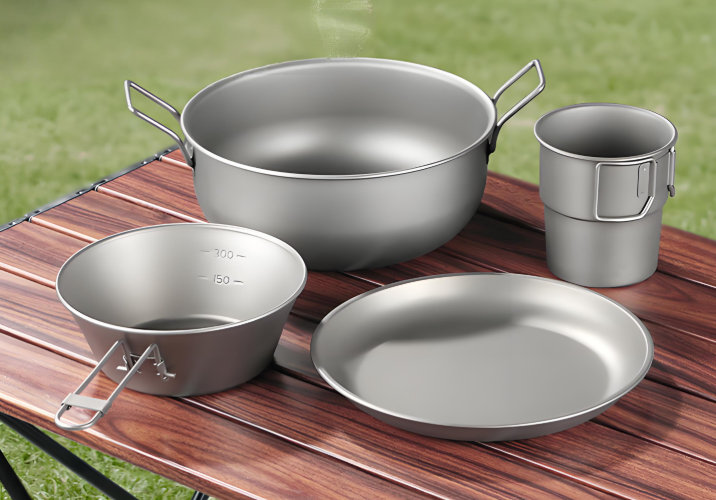
Pan
- size:
Φ300*90mm
- thickness:
1.5mm
- material:
titanium alloy
- application:
household
Titanium tableware
Titanium advantage
1. Biocompatibility and medical applications
Titanium has low allergenicity and excellent biocompatibility, and can form stable bonds with human tissues (such as osseointegration), and is widely used in medical devices such as dental implants and artificial joints
2. Mechanical property advantages
lightweight and high strength : The density is only 4.5g/cm³ (57% of that of steel), but the tensile strength of pure titanium reaches 265-550MPa, and that of titanium alloys (such as Ti-6Al-4V) can be increased to 860-1764MPa. The specific strength far exceeds that of steel and aluminum alloys
3. Other
● Good corrosion resistance : Titanium is hardly corroded in seawater, strong acid and strong alkali environments. The surface oxide film can self-heal and repair, and the corrosion rate after 10 years of seawater immersion is close to zero
● Low thermal conductivity : The thermal conductivity is only one fourth of that of steel, and it is used for heat-insulating cookware. It has a relatively high resistivity and is suitable for specific electronic scenarios.
Metal spinning performance
Pure titanium is more difficult to spin than stainless steel 304. Although their tensile strengths are similar and the hardness of pure titanium is lower than that of stainless steel, when pure titanium is spun, the edge of the workpiece is prone to wrinkling, which affects the further forming of the material. It is best to use a double roller machine to process pure titanium, as the spinning force is more uniform. At the same time, the blank can be slightly heated to avoid wrinkling of the workpiece during the spinning process. After the titanium is finally formed, the workpiece is thinned by shearing spinning. Only in this way can make the interior of the product be smoother. Otherwise, fatigue marks are likely to occur inside, affecting the polishing of the inner wall.
Turning ability
The turning performance of pure titanium is not good. It is prone to sticking to the tool, and the surface finish after turning is not smooth. It is easy to produce a granular feeling. In addition, pure titanium has a bigger springback during spinning, which cannot make the workpiece hold the mold tightly. Turning edge is prone to vibration of the tool. It is best not to perform edge cutting on a CNC spinning machine. Laser cutting can be used instead of CNC turning, which can increase production efficiency and make the edge smoother.
Polishing ability
Because the hardness of titanium is lower than that of stainless steel, it is more difficult to achieve a mirror-like finish when polishing titanium compare to stainless steel. Meanwhile, titanium conducts heat slowly, and local overheating and yellowing are prone to occur during polishing.
Titanium tableware cost
Titanium is a healthier metal than stainless steel, with better corrosion resistance and lower density. Titanium alloy tableware is lighter, so titanium alloy water cups and tableware are widely loved by outdoor sports enthusiasts. However, the material cost of titanium is five times that of stainless steel. It is more difficult to form by spinning or oil pressing than stainless steel, and the processing cost is higher. Therefore, titanium alloy tableware on the market is more expensive than stainless steel.
Dinnovation titanium tableware









